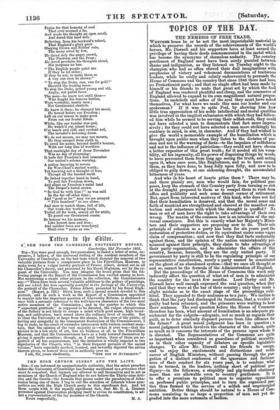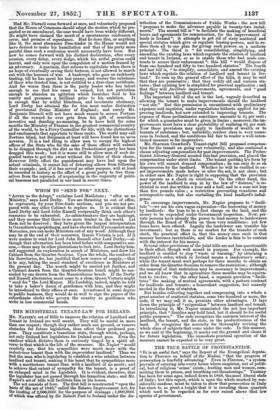TOPICS OF THE DAY.
TICE NEMESIS OF F13-FI1■ TRADE.
Wurrium brass be or be not the most imperishable material in which to preserve the records of the achievements of the world's heroes, Mr. Disraeli and his supporters have at least earned the privilege of having their deeds commemorated in the metal which has become the synonyme of shameless audacity. The country gentlemen of England must have been sorely puzzled between shame and indignation, as they listened on Tuesday night to the champion who had so often stirred their dull imaginations with prophecies of victory and vehement denunciations of traitorous leaders, while he coolly and calmly endeavoured to persuade the House of Commons and the country that since 1846 there had been no Protectionist party ; and that no single effort had been made by himself or his friends to undo that great act by which the food of England was rendered plentiful and cheap, and the commerce of England allowed to expand to its own magnificent natural propor- tions. In sackcloth and ashes of the soul they must have asked themselves, For what have we made this man our leader and our spokesman ? If it was to spite Peel, by showing him how little true appreciation of his noble intellectual and moral qualities was involved in the implicit submission with which they had follow- ed him while he seemed to be serving their selfish ends, they could not have selected a man to demonstrate that fact more impres- sively ; for they could not have selected a man more strikingly his contrary in mind, in aim, in character. And if they had wished to give the world a memorable example of the humiliation which is brought upon public men when they listen to the dictates of pas- sion and not to the warning of facts—to the impulses of selfishness and not to the influence of patriotism—they could not have chosen a better expositor of this great truth ; for it needed all his versa- tility, all his ingenuity, all his power of disguising things by words, to have prevented them from long ago seeing the truth, and acting upon it, when once seen, like Englishmen, and so to have caused them, as they have done, to heap folly upon folly, and now to be obliged to gulp down, at one sickening draught, the accumulated bitterness of years.
And who in his heart of hearts pities them ? There v be, and there plainly are, men who would fain, for political pur- poses, keep the stomach of this Country party from turning so sick at the draught proposed to them as to compel them to rush from office and publicity and seek some decent corner of retirement. But, apart from interested motives of this kind, who does not feel that their humiliation is deserved, and that the moral sense and faith of mankind are strengthened and cheered at the manifest con- tortion and reluctance with which the draught is quaffed ? No man or set of men have the right to take advantage of their own wrong. The maxim of the common law is an intuition of the uni- versal conscience. But this is exactly what her Majesty's Minis- ters and their supporters are proposing now to do. Their sole
principle of cohesion as a party has been for six ,ears past the restoration of protective duties, or its equivalent under some vague
claim of compensation ; and now that they find facts undeniably against them, and the opinion of the nation unmistakeably pro- nounced against their principle, they claim to take advantage of
their party organization, and to administer the affairs of this
country, because, forsooth, they are the only united party. If government by party is still to be the regulating principle of our representative constitution, surely a party cannot be constituted on the ghost of an abandoned system—that we once all thought so and so, cannot be the formula of the Administration of England.
But the proceedings' of the House of Commons this week only indirectly affect the question of what set of men is to administer
the country for the next few months. Lord Derby and Mr.
Disraeli have well enough expressed the real question, when they said that they were at the bar of their country ; only they made a
slight mistake as to the exact stage of the proceedings exhi- bited. They appealed to their audience as to a jury. We incline to think that the jury had discharged its functions, that a verdict of guilty had been returned, and the prisoners were waiting to hear
their sentence. The real question before the House of Commons therefore has been, what amount of humiliation is an adequate pu-
nishment for the culprits—adequate, not so much as regards their guilt, as to deter similarly disposed persons from like offences for the future ? A great moral judgment has been in question ; a moral judgment which involves the character of the nation, quite as much as it concerns the interests of the persons upon whom it is directed. The Representatives of the Commons are quite as important when considered as guardians of political morality,
as in their other capacity of debaters on specific legislative changes. To allow Mr. 'Disraeli and his friends to escape,
and to enjoy the emoluments and distinctions and noble career of English Ministers, without passing through the pur- gation of a distinct confession of the ignorance and factious- ness of their conduct for six years past, is to condone what can be termed, in the leaders, nothing short of political pre- fligacy—in the followers, a stupidity and pig-headed obstinacy more than are allowable even to country gentlemen. It is to offer a premium to political men to organize oppositions on professed public principles, and to turn the organized par-
ties thus formed to the service of a selfish and unprincipled ambition. Better things should be natural to a House of Com- mons consisting in so large a proportion of men not yet de- graded into the mere automata of faction. Had Mr. Disraeli come forward at once, and voluntarily proposed that the House of Commons should adopt the motion which he pre- sented as an amendment, the case would have been widely different. He might have claimed the merit of a spontaneous confession of error, and promise of repentance. Had he done this, or anything like it, the most strenuous Free-trader in the House would not have desired to make his humiliation and that of his party more painful than such a confession would necessarily have been. But now he comes forward with his distinct declaration, after every evasion, every delay, every dodge, which his artful genius could invent, and only now upon the compulsion of a motion framed by an adversary. A garrison, that refuses to capitulate when there is no hope of eventually saving their fortress, is not allowed to march out with the honours of war. A bankrupt, who goes on recklessly trading, till he has spent his last penny, and wastes the substance of those who trusted him, is not entitled to a first-class certificate. And far worse than these is the party leader who has talent enough to see that his cause is ruined, but not patriotism enough to abandon an agitation which furnishes food to his vanity and promises a brilliant prize to his ambition. It is enough that by wilful blindness, and inveterate obstinacy, Lord Derby has attained the for him most undue distinction of provisional Prime Minister of England ; and surely Mr. Benjamin Disraeli will not have much reason to accuse Fortune if all the reward he ever gets from his gift of scurrilous invective and dazzling no-meaning, be to have held for some months the Ministry of Finance in the greatest commercial country of the world, to be a Privy Councillor for life, with the distinctions and emoluments that appertain to these ranks. The world may call Fortune blind, but Benjamin at least will have found her no szeva noverca. It is a bad thing to allow men to occupy the highest offices of the State who for the sake of those offices will submit to be dragged through the dirt as the Protectionist party has been dragged this week ; but it is worse still to allow men of such de- graded tastes to get the sweet without the bitter of their choice. However little effect the punishment may have had upon the actual criminals, it cannot fail of deterring others from following their example ; and, if it has served no other purpose, will at least be recorded in history as the effort of a great party to free them- selves from the reproach of acquiescing in the impunity of politi- cal baseness not paralleled in our land in recent times.



























 Previous page
Previous page